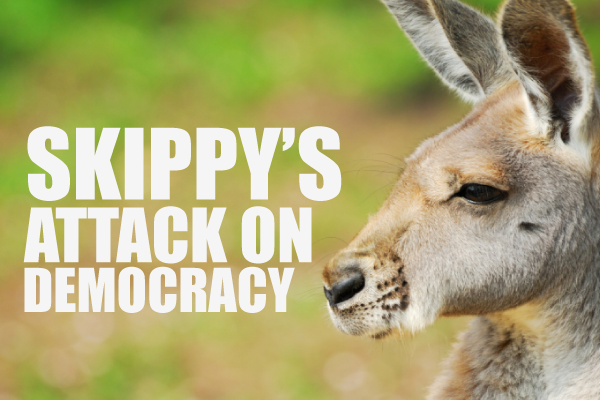
If you can’t win the battle of ideas, rig the game. That’s basically what conservatives are up to with their latest coup: the “Fair” Elections Act.
And to demonstrate their commitment to democracy, the Conservatives are dedicating several days to debate this very important bill…. Oh wait, no. That would be in an alternate universe that makes sense.
In actual fact: the Conservatives are rushing the bill through parliament and limiting debate.
The 252-page bill makes substantial changes to the Canada Elections Act; some of which have been called Orwellian.
For starters, the bill would muzzle the chief electoral officer – only allowing him to speak about “how and where to vote.”
During an interview with CBC Radio last weekend, Chief Electoral Officer Marc Mayrand said the act would limit his ability “to provide information to the public.”
And Elections Canada would be stripped of its outreach activities: no more ads encouraging citizens to vote – because the Conservative government believes that a 60% voter turnout is good enough in this country and because Pierre Poilievre believes that “political candidates who are aspiring for office are far better at inspiring voters to get out and cast their ballot than are government bureaucracies.”
Then again, Poilievre (AKA “Skippy”) believes that the root cause of terrorism is terrorists….
But if you weren’t convinced that the Conservatives are trying to stack the deck in their favour, consider that they’re increasing donation and spending limits… because, as we know from looking at the U.S., getting more big money into politics really enhances our democracy.
The Act also borrows another Republican strategy; enacting stricter voter ID laws to disenfranchise low-income earners, students, the homeless and Aboriginal Peoples. The Conservatives are crying wolf over the issue of “vouching”, which enfranchises voters without the proper paper identification.
Minister Poilievre cites a study commissioned by Elections Canada, written by Harry Neufeld, which claims that the “irregularities” for vouching voting was around 25%. Yet when one looks at the report, Neufeld is using the term “irregularities” in reference to electoral workers ‘irregularly’ applying policy, not confirmed cases of voter fraud by vouching.
But just like in the U.S., the Conservatives are going to use the widespread voter fraud bogeyman argument to make their case. Many Republican-controlled states have introduced strict voter-ID laws to “prevent voter fraud” – but really, the goal is to disenfranchise the economically-disadvantaged, students, blacks and Latinos; all of whom are likelier to vote Democratic. As many as 11% of American voters are without government-issued photo ID.
These new voter ID-laws have been heavily criticized; civil rights activist Reverend Al Sharpton has compared these laws to the Jim Crow-era poll taxes that prevented newly-enfranchised blacks from voting.
Pennsylvania and Arizona have seen their voter-ID laws overturned by the courts; Florida and Iowa launched costly investigations into the issue “widespread” voter fraud and turned up zip.
When the Brennan Institute studied voter fraud, they came up with fraud rates of 0.0002% in Wisconsin and 0.0006% in New Hampshire. Hardly a “widespread” problem.
The real threats to democracy take the form of well-orchestrated misinformation campaigns. During the 2012 presidential elections, voters in Florida, Indiana and Virginia received calls telling them to vote by phone.
These misinformation tactics aren’t all that different from what many Canadians experienced at the hands of “Mr. Pierre Poutine”. But does the so-called Fair Elections Act do anything to crack down on that type of voter suppression?
“With another election coming soon, Canadians still don’t know what really happened in 2011 or who was responsible,” wrote the Ottawa Citizen’s editorial board. “Mayrand has said that the Commissioner of Canada Elections should have the power to compel testimony; this bill does not create that.”
“The removal of investigative powers from Elections Canada is the most revealing change,” wrote the Ottawa Citizen’s editorial board.
The Council of Canadians has a petition on their website calling for a truly fair elections act here. The NDP also has its own petition calling on Parliament to reject Bill C-23.